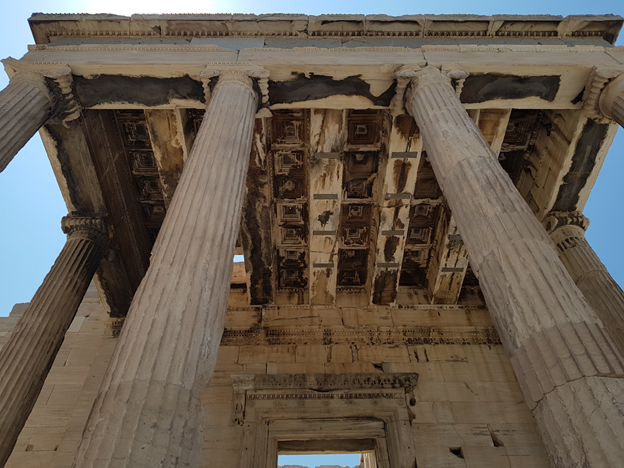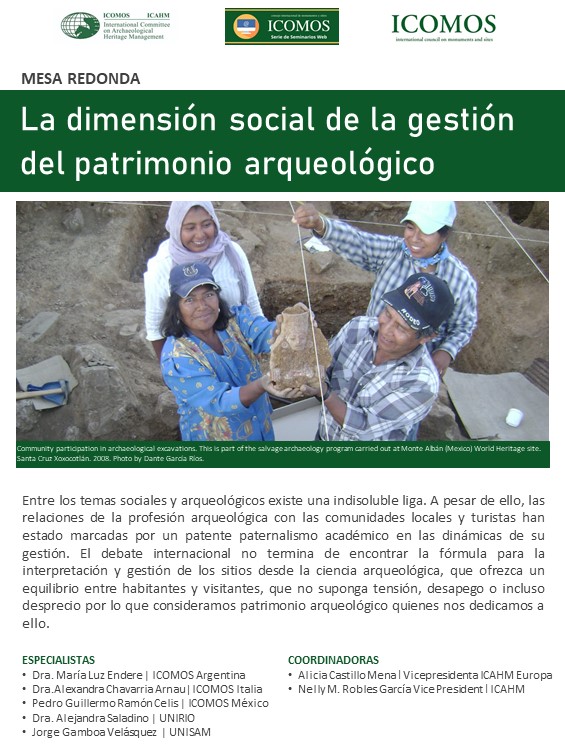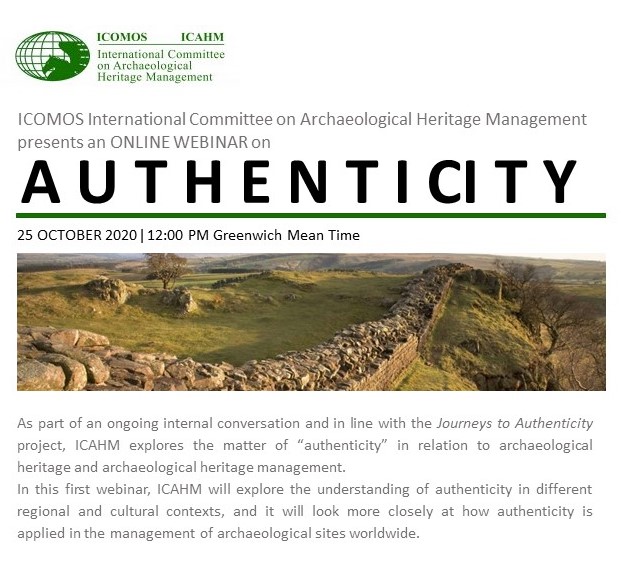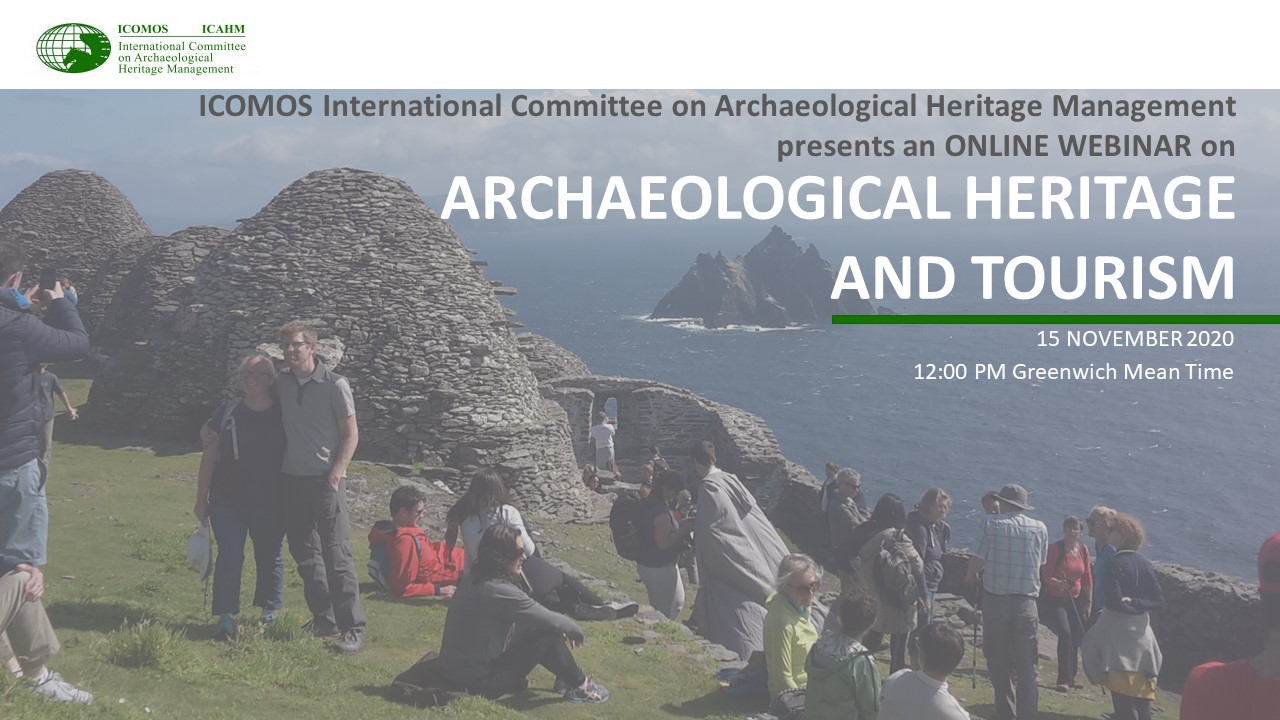With its international network of professionals and experts, ICAHM aims to offer a comprehensive view on complex issues related to the management of archaeological places. The topics selected for this first series of online lectures aims at investigating key and challenging topics for professionals dealing with archaeological sites – identifying, assessing and conserving authenticity; and tourism.
In this lecture series, ICAHM wants to offer a platform for knowledge and experience sharing that can be of support to practitioners and professionals all around the globe.
Upcoming Talks
ICAHM Talks are online conferences aimed at bringing together the ICAHM membership together with the wider ICOMOS membership and other interested professionals in exploring and discussing together case studies and challenges being faced in the management and conservation of archaeological places worldwide.
Previous Talks
ICAHM TALK Vol. 1 – 27 March 2021 – 12:00PM (Paris time)

Authentic fakes and the preservation of original archaeological heritage Prof. IAN LILLEY
A great deal has been written about digital heritage, including the digital replication of archaeological heritage. Such replication has obvious benefits in terms of education/outreach and aspects of analysis. It can also help with the preservation of original archaeological heritage, mostly by reducing visitor pressure on the latter. Yet the ever-increasing sophistication of digital technology together with research indicating that digital replicas acquire forms of authenticity themselves prompts one to ask whether such “authentic fakes” will become the preferred approach of cash-strapped governments to the conservation and management of archaeological heritage as a kind of “preservation by recording” that will see the originals more readily subject to damage or destruction by development or neglect.
Major public works and antiquities. Views on authenticity and best practices
Dr ELENA KORKA
In recent decades there has been a significant increase in major public works, in which antiquities of great importance have come to light, broadening the horizons of our knowledge on many aspects of human history. The discovery of these antiquities raises multiple questions on the issue of cultural management, involvement of local communities and sustainable development. For example, many antiquities have come to light as part of subway construction projects in various parts of the world. Typical cases of antiquities that have been discovered in the context of metro projects will be examined, such as the case of Rome, Naples, Palermo, Algeria, Athens and Thessaloniki, as well as the case of the transfer of antiquities to Abu Simbel in Egypt due to the need to create an artificial lake. Issues of good practice dealing with such cases, whereby the discovery of antiquities in major public projects is considered a benefit and not damnation, and how the question of the coexistence of these witnesses of the past with everyday life is solved, will be put to scrutiny. Furthermore, the issue of maintaining the authenticity of these antiquities shall be raised and various solutions will be presented through best practices already applied. The relevant provisions of the texts of international conventions and charters will be examined and the need of creating new international texts with specific guidelines on the subject will also be put on the table for discussion.
Management of Indigenous Australian Cultural Heritage Values
Dr. MATTHEW WHINCOP
The increase in the Australian extractives industry in recent decades, has been matched with a corresponding boom in investigations into Australia’s indigenous cultural heritage. Conventional Cultural Heritage Management, and associated legislation, has focused largely on the archaeological, tangible remains of Australia’s First Nations. Typical site types include artefact scatters, scarred trees, rock art sites, artefact production sites, and the occasional burial. While Australian archaeologists generally have a good track record for effectively managing tangible, cultural sites, it is becoming clearer that Aboriginal culture does not recognise a clear distinction between culture and nature. As a result, archaeologists are called upon to identify cultural values of a less tangible nature.
Previous Webinars
WEBINAR – 27 February 2021, 14:00 CET – La dimensión social de la gestión del patrimonio arqueológico

Register in advance for this meeting:https://zoom.us/meeting/register/tJcodu2gqTMqEtKUVW_3NDYYmSPkJSRqReWa
After registering, you will receive a confirmation email containing information about joining the meeting.
WEBINAR – 25 October – Authenticity 
Moderator: Matt Whincop, ICOMOS ICAHM
Speakers:
James L. Flexner, University of Sydney
Michael Jansen, RTWH Aachen University/GUTech
Ndukuyakhe Ndlovu, University of Pretoria
Register in advance for this meeting:
https://zoom.us/meeting/register/tJ0oce-sqjooGdW3R1b726axhh8sdmTo9YFz
After registering, you will receive a confirmation email containing information about joining the meeting.
WEBINAR 2 – 15 November – Sustainable use and tourism

PROGRAM
The sustainable use of archaeological places is a key issue. While the protection of archaeological places and their value is of great importance, there is also the need to cooperate with local actors in developing sustainable strategies for the use of archaeological resources as a means to local sustainable development.
Among the many possible uses of these places, tourism is one of the activities that can have a more drastic impact in the management of heritage places, both positively and negatively.
You are invited to a Zoom meeting.
When: Nov 15, 2020 12:00 PM Greenwich Mean Time
Register in advance for this meeting:
https://zoom.us/meeting/register/tJUlcO6sqTwiHdWemSThAmgdML80kpHNL6ic
After registering, you will receive a confirmation email containing information about joining the meeting.

